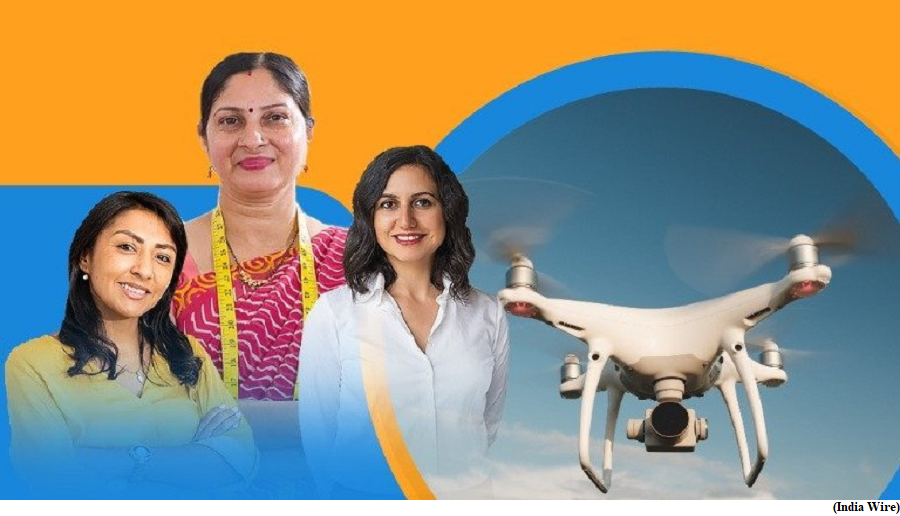Cabinet approves Central Sector Scheme for providing Drones to the Women Self Help Groups (GS Paper 1, Social Issue)

Why in news?
- The Union Cabinet recently approved Central Sector Scheme for providing Drones to the Women Self Help Groups (SHGs), with an outlay of Rs. 1261 Crore for the period from 2024-25 to 2025-26.
Details:
- The scheme aims to provide drones to 15,000 selected Women SHGs during the period 2023-24 to 2025-2026 for providing rental services to farmers for agriculture purpose.
- The scheme seeks to empower women Self Help Groups (SHGs) and bringing new technologies through drone services in agriculture sector.
Key Highlights:
- The scheme approves holistic interventions by converging the resources and efforts of Department of Agriculture & Farmers Welfare (DA&FW), Department of Rural development (DoRD) and Department of Fertilizers (DoF), Women SHGs and Lead Fertilizer Companies (LFCs).
- Appropriate clusters where usage of Drones is economically feasible will be identified and progressive 15,000 women SHGs in various States in the identified clusters will be selected for providing drones.
- Central Financial Assistance @ 80% of the cost of drone and accessories/ancillary charges up to a maximum of Rs. Eight Lakh will be provided to the women SHGs for purchase of drones. The Cluster Level Federation (CLFs) of SHGs may raise the balance amount (total cost of procurement minus subsidy) as loan under National Agriculture Infra Financing Facility (AIF). Interest subvention @ 3% on the AIF loan will be provided.
- One of the members of the women SHGs who is well qualified, 18 and above years of age will be elected by the SRLM and LFCs for 15 day training comprising of 5 day mandatory drone pilot training and additional 10 day training for agriculture purpose of nutrient and pesticide application.
- The other member / family member of the SHG with inclination to take up repairs of electrical goods, fitting and mechanical works will be selected by the State Rural Livelihood Mission (SRLM) and LFCs who will be trained as drone technician/assistant. These training shall be provided as a package along with the supply of drones.
- Considering the difficulties which SHGs may face in procuring the drones, repair and maintenance of drones through drone companies, the LFCs will act as a bridge between drone supplier companies and SHGs.
- LFCs will also promote use of Nano Fertilizers such as Nano Urea and Nano DAP by the drones with SHGs. SHGs will rent out the drone services to the farmers for Nano fertilizer and also for pesticide applications.
Way Forward:
- It is envisaged that the approved initiatives under the scheme will provide sustainable business and livelihood support to 15,000 SHGs and they would be able to earn additional income of at least Rs.One lakh per annum.
- The scheme will help infusing advance technology in agriculture for improved efficiency, enhance crop yield and reduced cost of operation for the benefit of farmers.
Cabinet approves continuation of Centrally Sponsored Scheme for Fast Track Special Courts
(GS Paper 2, Judiciary)
Why in news?
- The Union Cabinet has recently approved the continuation of Fast Track Special Court (FTSCs) as, a Centrally Sponsored Scheme (CSS) from 1st April 2023 to 31st March 2026 with financial implication of Rs. 1952.23 crore (Rs. 1207.24 crore as Central Share and Rs. 744.99 crore as State share).
- Central Share is to be funded from Nirbhaya Fund.
- The Scheme was launched on 2nd October, 2019.

Background:
- Incidents involving the rape of girl child and women have deeply impacted the nation.
- The frequency of such incidents and the prolonged trials of offenders necessitated the establishment of a dedicated court system capable of expediting trials and delivering immediate relief to victims of sexual offenses.
- Consequently, the Central Government enacted the "The Criminal Law (Amendment) Act. 2018," which included stringent punishment, including the death penalty for rape offenders, leading to the creation of the Fast Track Special Courts (FTSCs).
FTSCs:
- FTSCs, designed as dedicated courts, are expected to ensure swift dispensation of justice, offering quick relief to victims while strengthening the deterrence framework for sexual offenders.
- The Union of India formulated a Centrally Sponsored Scheme to establish FTSCs for the timely disposal of cases related to rape and the Protection of Children from Sexual Offences Act (POCSO Act) in August 2019.
- Following the directions of the Supreme Court of India in suo moto Writ Petition, the scheme mandated the establishment of exclusive POCSO Courts for districts with over 100 POCSO Act cases.
- Initially commenced in October 2019 for one year, the scheme was extended for an additional two years until 31st March 2023.
- Now, it has been further extended until 31st March 2026, with a financial outlay of Rs. 1952.23 crore, with the Central Share funded from the Nirbhaya Fund.
Implementation:
- Implemented by the Department of Justice, Ministry of Law & Justice, the Centrally Sponsored Scheme of FTSCs augments State Government resources for establishing FTSCs across the country, ensuring the swift disposal of cases related to rape and the POCSO Act.
- Thirty States/Union Territories have participated in the Scheme, operationalizing 761 FTSCs, including 414 exclusive POCSO Courts, which have resolved over 1,95,000 cases.
- These courts support State/UT Government efforts to provide timely justice to victims of sexual offenses. even in remote and far-flung areas.
The expected outcomes of the scheme are:
- Reflect the nation's commitment to ending sexual and gender-based violence.
- Substantially reduce pending cases of Rape & POCSO Act, relieving the burden on the judicial system.
- Ensure swift access to justice for victims of sexual crimes through improved facilities and expedited trials.
- Lessen the burden of cases to a manageable number.



